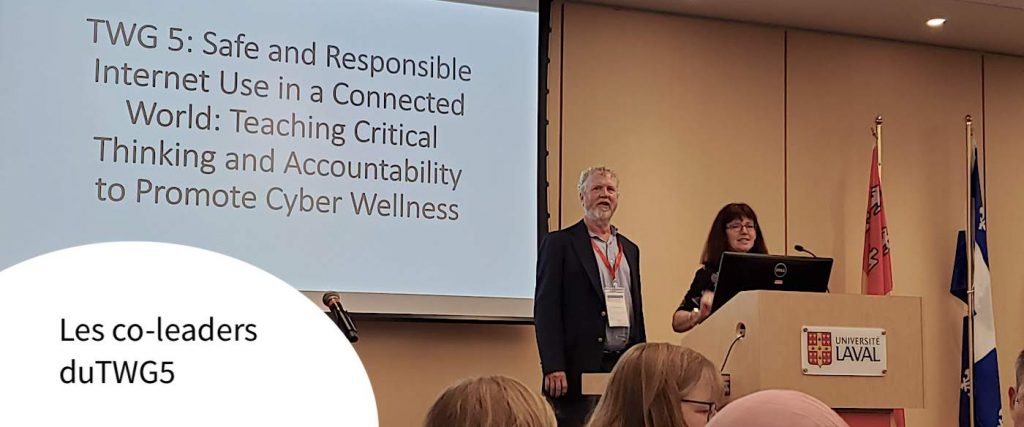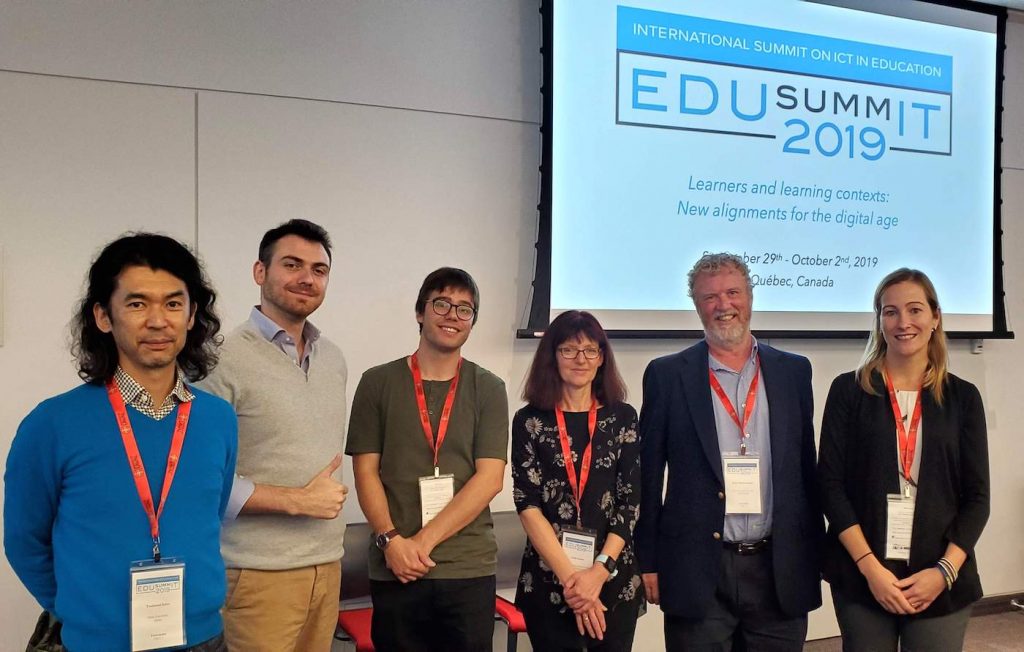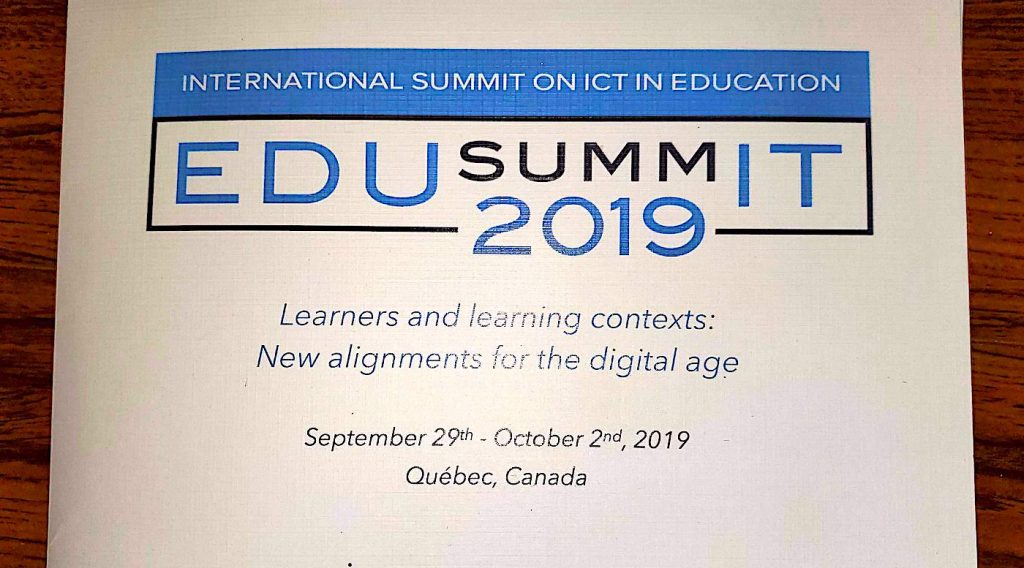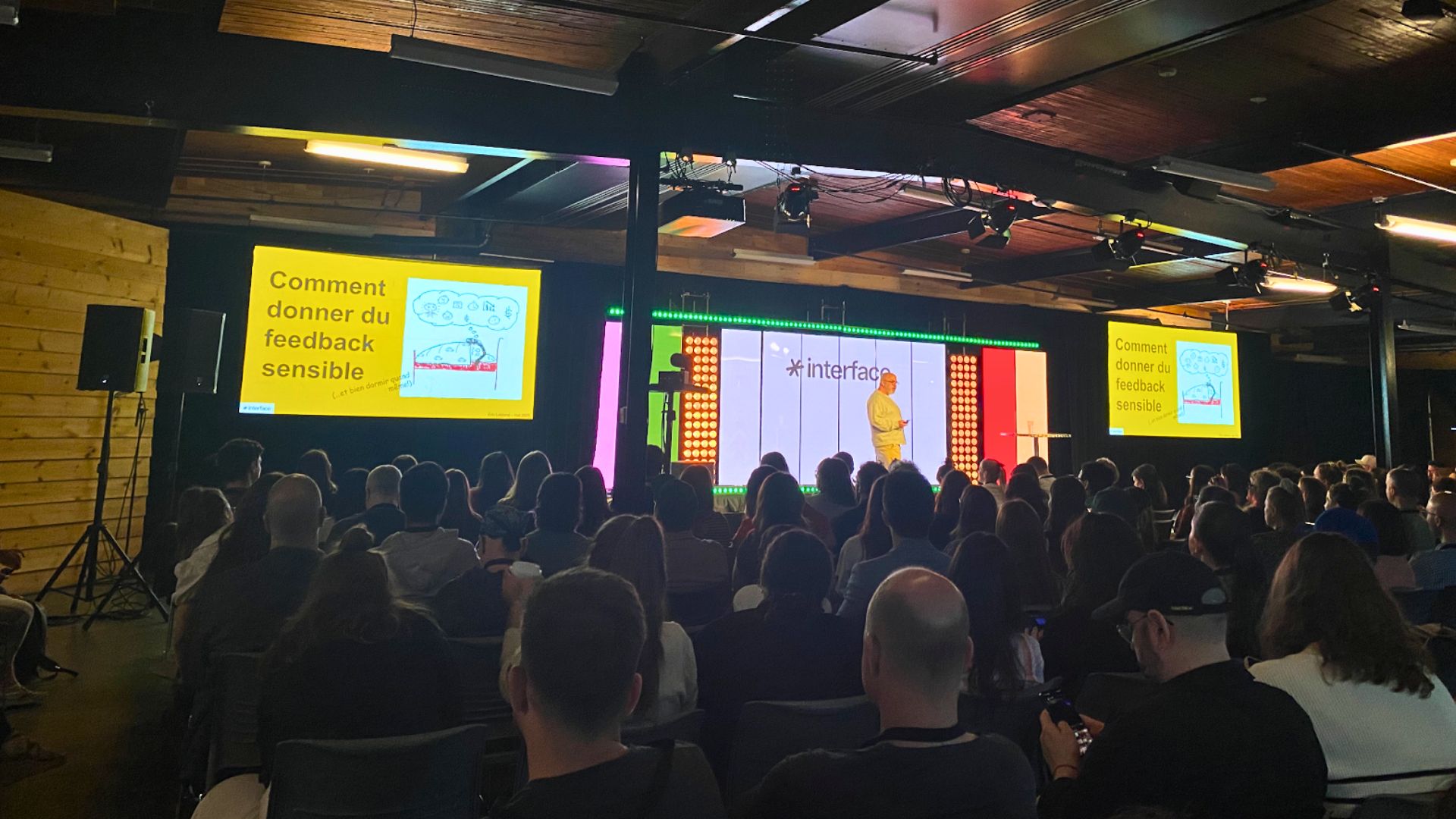Retour sur les constats et pistes d’action du groupe ayant travaillé sur la question du bien-être en ligne chez les jeunes à l’occasion du EDUsummIT 2019.
Texte par Alexandre Brzozowski (Hainaut Enseignement) et Audrey Miller (L’École branchée), avec la participation de Quinn Johnson (Université Laval)
À l’occasion du EDUsummIT 2019, qui s’est tenu du 30 septembre au 2 octobre 2019 à l’Université Laval, des chercheurs et praticiens de nombreux pays se sont réunis autour de 13 questions relatives à l’univers numérique en éducation.
Pour notre part, nous avons contribué aux réflexions du TWG (Thematic Working Group) 5, autour de la question de l’utilisation sécuritaire et responsable d’Internet dans un monde connecté, dans une perspective de favoriser le sentiment de bien-être en ligne chez les jeunes. (Les activités du sommet s’étant déroulées en anglais, le libellé exact était le suivant : Safe and Responsible Internet Use in a Connected World: Teaching Critical Thinking and Accountability to Promote Cyber-wellness.)

Le bien-être numérique? Le bien-être global!
Ce thème est source d’une panoplie de préoccupations pertinentes dans le monde moderne. Pensons seulement à la prolifération des fausses nouvelles, à la cyberintimidation, aux techniques de manipulation, au manque de transparence dans l’utilisation de nos données personnelles, etc.
En effet, le développement de plus en plus d’applications numériques est guidé par des objectifs mercantiles qui enchainent de plus en plus de jeunes, et d’adultes également, en se basant par exemple sur les dernières connaissances en neurosciences et en neuromarketing.
Nos travaux nous ont donc amenés à considérer la nécessité d’envisager le bien-être numérique comme faisant partie intégrante du bien-être global.
Développer l’autorégulation plutôt qu’installer des barrières
Nous avons relevé qu’il était nécessaire de développer des structures de réflexion et de sensibilisation qui, loin d’être dans un protectionnisme limitatif, inciteront plutôt les futurs citoyens à prendre conscience de l’ensemble des dynamiques du système, les menant ainsi à autoréguler leur utilisation des technologies (“protect by empowering”).
Nous en venons à la conclusion que, dans l’objectif de pérenniser cette conscience globale à propos des technologies numériques, la démarche réflexive de l’ensemble des intervenants, enfants, parents, directeurs, enseignants, designers et politiques, doit faire partie des curricula et faire l’objet d’un processus itératif permanent, considérant la vitesse de l’évolution des mondes numériques.
Parmi les pistes d’action proposées par notre groupe de travail en lien avec le développement de l’autonomie face aux enjeux actuels et à venir, notons :
- Accroître la participation des jeunes dans la conception et la réalisation de recherches scientifiques ainsi que dans l’élaboration de politiques et de pratiques éclairées;
- Développer des communautés d’élèves habilités à soutenir leurs pairs et les adultes au sein des institutions scolaires.
L’objectif est, d’une part, d’augmenter le niveau de conscience globale en ce qui concerne les neurosciences et la façon dont le numérique influence le cerveau, mais également d’augmenter la capacité des enseignants, des jeunes et de leurs parents à devenir des « consomm’acteurs » ayant le pouvoir de transformer les outils qu’ils utilisent et consomment, et ce, pour l’émancipation du plus grand nombre. Cette émancipation passera à notre avis par l’instauration d’un scepticisme sain (“healthy skepticism”) chez l’ensemble de la population.
Une phrase-clé est ressortie pour résumer l’ensemble des réflexions : Protect by empowering (Protéger par l’autonomisation).
Les co-leaders du TWG5 étaient Dale Niederhauser (Université de West Virginia, États-Unis) et Cathy Lewin (Université Manchester Metropolitan, Royaume-Uni). Les membres qui les ont appuyés sont : Remco Pijpers (Kennisnet, Pays-Bas), Roger Sherman (Cambodia Foundation for Higher Education, Etats-Unis), Toshinori Saito (Université Seisa, Japon), Francois Guité (consultant indépendant, Canada), Audrey Miller (L’École branchée, Canada), Alexandre Brzozowski (Hainaut Enseignement et Université de Mons, Belgique), Patrick Hould (ministère de l’Éducation et de l’Enseignement supérieur du Québec, Canada), Quinn Johnson (Université Laval, Canada) et Akira Sakamoto (Université Ochanomizu, Japon).

Les 13 thèmes du EDUsummIT 2019
Il sera intéressant de surveiller les publications scientifiques officielles qui émaneront du EDUsummit 2019. D’ici là, voici les 13 thèmes qui ont été travaillés. Il est possible de consulter les documents pertinents au fur et à mesure qu’ils seront déposés dans les espaces de travail :
- TWG 1: Technology developments: how human computer interactions change with technological innovation
- TWG 2: Learners as learning leaders: how does leadership for learning emerge beyond the traditional teaching models?
- TWG 3: Creativity for teachers and teaching
- TWG 4: Thinking about machine learning – implications for education
- TWG 5: Safe and Responsible Internet Use in a Connected World: Teaching Critical Thinking and Accountability to Promote Cyber-wellness
- TWG 6: Putting learning back into learning analytics: optimizing learning through analysing the data
- TWG 7: Connected learning: online human interaction and interaction with digital resources
- TWG 8: Pedagogical reasoning and reflective practice: a framework for teaching in a digital age
- TWG 9: Advancing models and theories of technology integration: implications for researchers, practitioners and policymakers
- TWG 10: New paradigms for researching digital technologies: achieving scaleability and sustainability
- TWG 11: Cross-cultural alignments, fertilization, differentiation: bridging the gaps through technology
- TWG 12: National policies in curriculum reforms: what makes a quality curriculum in a technological era?
- TWG 13: Knowledge building/knowledge creation in the school classroom and beyond
En terminant, merci au comité de pilotage 2019, composé de Joke Voogt (Pays-Bas), Gerald Knezek (Etats-Unis), Petra Fisser (Pays-Bas), Margaret Cox (Grande-Bretagne) et Thérèse Laferrière (Canada), ainsi qu’à tous ceux qui ont participé à l’organisation et au succès de cet événement. Rendez-vous en 2021 à Kyoto, au Japon, pour la prochaine édition!














